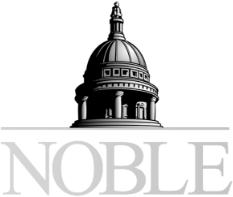Here's When Veteran Hospitality Investor Mit Shah Sees The Industry Fully Recovering
After nearly three decades in the hospitality business, Noble Investment Group CEO, Mit Shah, has seen industry crises before. He quickly lists the Russian financial crisis in 1998, the dot-com bust in 2000, 9/11, the Great Recession in 2007-2008 and now, the Covid-19 pandemic as moments his company and others have had to refocus priorities and alter business models. "We know what is forthcoming because of the history we've been through, lived through and invested through," said Shah.
RevPAR dropped more than 50% during the pandemic, more than it did during 9/11 (-9.6%) and the Great Recession (-19%), combined. "This is a business where you have to know what you are doing," said Shah. "I think, having gone through it a bunch of times, each scenario is different."
Shah talked to Atlanta Business Chronicle about getting through the pandemic, industry trends and changes that are here to stay and the bleisure movement.
Do you believe the hospitality industry will bounce back to pre-pandemic levels of occupancy, for example, or does it even have to?
I absolutely do. It will bounce back; but it’s going to look different. It always looks different. It’s going to take some time; leisure travel is back but we don’t think corporate travel is going to come back for another 18-24 months. We think the industry will be back to pre-pandemic by the end of next year or 2024. It will look different, but we think have multiple years of growth coming on after that, as well.
What trends do you see in the hospitality market that have come into play due to the changes brought on by the pandemic?
When you talk about the trends that are happening, you have to start with the fact that there’s innovation that has been building in our industry prior to the pandemic that really got implemented during the course of these two years.
Are those innovations here to stay? If so, is that good or bad for the industry?
Innovations in hotel technology, operations and design, that did a couple of things. Early on it was to minimize the person-to-person interactions, doing things like contactless check-in, mobile keys, and contactless payment. Then it was shifting to non-daily guest room housekeeping and reduced breakfast offerings. Originally these things were done to address customer concerns and expectations around hygiene, but now they have become the norm at a lot of hotels.
What can the industry do even better than before?
One of the other things that hotels have begun to do better is how food gets delivered. Flex service hotels' partnerships with restaurants through Uber Eats and DoorDash
How do you feel about the Bleisure (business + leisure) phenomenon?
I am a big proponent that people need to be with each other to do business. That’s how you get to know people. I think there’s going to be a competitive disadvantage without being face-to-face. Having said that, I believe this bleisure phenomenon is real. If there’s flexible work schedules where people are working Monday through Wednesday in the office and Thursday/Friday work remotely, why not take the family and go somewhere for the weekend?
How can hotels take full advantage of this?
That requires hotels to be able to have technology and bandwidth and traditional business centers and coworking spaces with tech-enabled devices. Nobody is traveling with their printers. Hotels need to do all of that while still addressing the health and wellness trends.
Give me an idea that you have seen work immediately.
Peloton Rooms. People get on a bike and do their conference calls. We have seen huge demand for these kinds of rooms.
Resorts sales have dominated the market this year (and during Q4 2021). Why are investors so interested in resorts besides the usual reasons — outdoor amenities, longer stays than downtown central business district hotels?
Resorts are incredibly hard to replicate, so once you have one, you know that you are not going to have significant amounts of competition. I think what we have all realized coming through the pandemic is that our time with our families, vacation travel and leisure travel is non-negotiable. Resorts are outside, they created a kind of bubble where people feel safe. Resorts have this incredible durability.
Two years into the pandemic, how do you feel about the state of hotel investment opportunities?
We have made over $1 billion of investments in the last 12 months. We’re still at the tip of this crisis and what will take place. This is our 29th year of business and there isn’t an institutional investor in the hotel space that has been doing this as long as we have.
Donnell Suggs
Sports and Entertainment Reporter
Atlanta Business Chronicle
